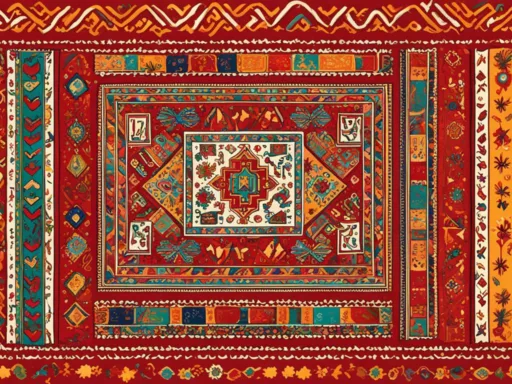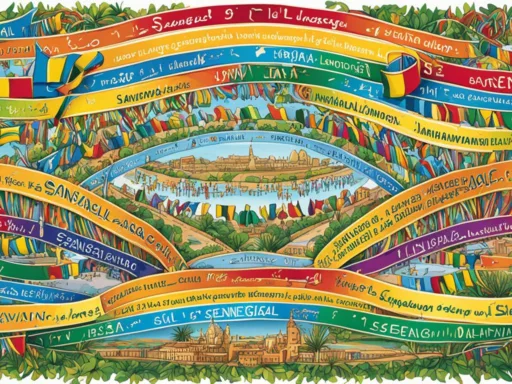At the crossroads of ancient civilizations, Jordan’s vibrant culture is matched by its diverse linguistic heritage. As the heart and soul of Western Asia, this kingdom offers a unique blend of languages that are integral to its identity and dynamic society. The languages spoken in Jordan serve as both a testament to its rich history and a bridge to the global community. Central to understanding Jordan is its Arabic language, an undeniable cornerstone of daily life, commerce, and governance. Yet, beyond the ubiquitous presence of Arabic, the official language of Jordan, lies a remarkable linguistic diversity.
From the bustling streets of Amman to the windswept deserts, one discovers the harmonious coexistence of various dialects and foreign tongues, illustrating the most spoken languages in Jordan. English, with its colonial roots and academic prestige, has seeped into the very fabric of Jordanian society, highlighting its role in international affairs and commerce. Each word, phrase, and dialect spoken in this land tells a story—a story of connection, tradition, and progress.
Key Takeaways
- The official languages of Jordan are a reflection of the country’s geopolitical significance and cultural enclave.
- Arabic language in Jordan lays the foundation for national identity and is universally understood amongst its citizens.
- English boasts a special status in education and professional realms, making it one of the most spoken languages in Jordan.
- A historical confluence of cultures has fostered a multilingual environment, enriching the languages spoken in Jordan.
- Foreign languages like French and German, though less prevalent, play significant roles in Jordan’s educational and cultural exchanges.
An Overview of Jordan’s Linguistic Landscape
Jordan’s linguistic diversity is a reflection of its rich history and varied geography. As the land of ancient kingdoms and civilizations, Jordan has fostered a language landscape that’s both complex and compelling. Let’s explore the tapestry of tongues that make up this nation’s unique cultural quilt.
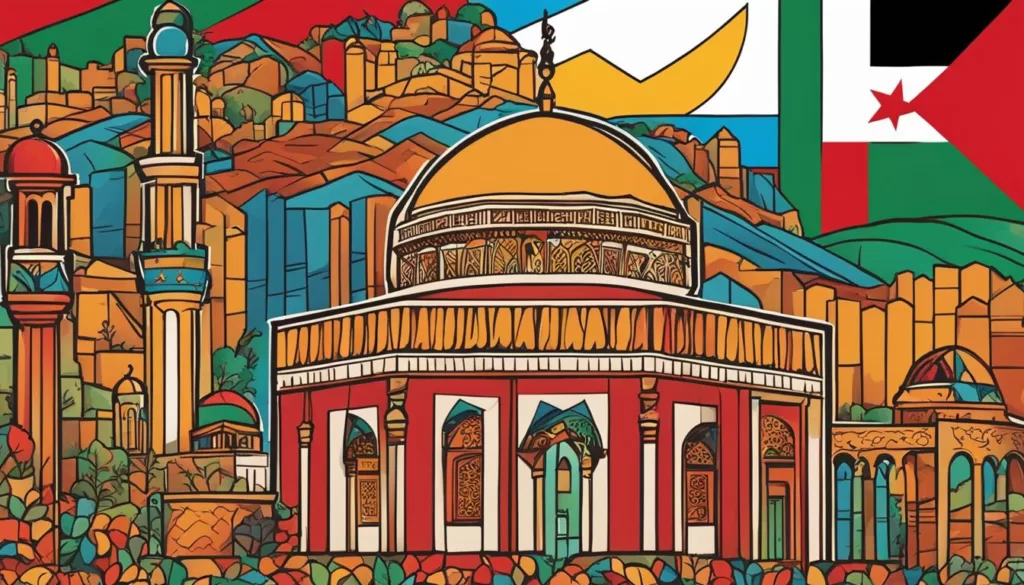
The Influence of History and Geography on Jordan Languages
The mosaic of Jordan languages is deeply inlaid with historical significance. From the time of Moab, Edom, and Ammon, the region has seen languages evolve in response to myriad cultural and political shifts. These dynamics have left an indelible mark on the way Jordanians communicate.
The Role of Arabic in Jordanian Society
In Jordan, Arabic is not just a means of communication; it is the cultural and social bedrock of the nation. As the Arabic language Jordan has officially adopted, it serves a critical role in governance, education, media, and everyday transactions among its citizens. The prevalence of Arabic solidifies the national identity and unifies the country’s predominantly Arab population.
English Usage in Education and Commerce
English enjoys a privileged status in the official languages Jordan acknowledges for its integration into education and business. Tracing its importance back to the post-British colonial era, English has become indispensable for global commerce, professional opportunities, and academic advancement within Jordan. It is the educational standard and a linguistic bridge to the international sphere for Jordanians.
Languages Spoken in Jordan: Delving into Dialects
The tapestry of languages spoken in Jordan is as diverse as its history, with a variety of dialects that define the linguistic landscape of this nation. The Arabic language in Jordan reflects a nuanced spectrum influenced by time, terrain, and the tongues of other nations.
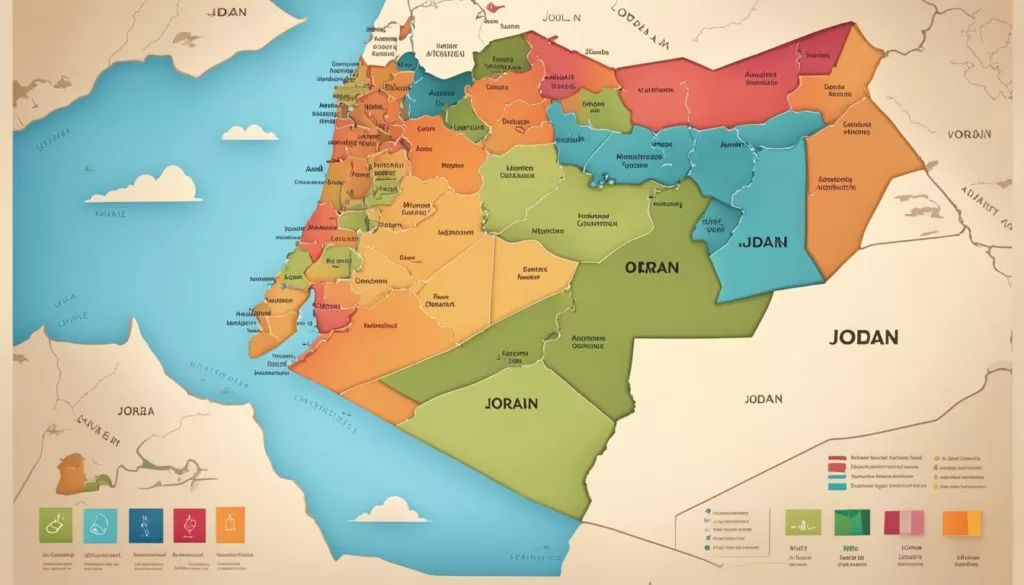
Varieties of Arabic: Urban, Rural, and Bedouin Dialects
Amidst the most spoken languages in Jordan, Arabic dialects stand out with three distinct styles: urban, rural, and Bedouin, each with its unique cadence and characteristics. Urban Arabic in Jordan, a melting pot of linguistic elements from different regions, merges the speech patterns of those who once migrated from surrounding areas like Hauran and Moab, with those from Palestinian heritage. Rural Arabic is more indigenous, echoing the long-standing agricultural lifestyle of the country’s heartlands. Contrastingly, the Bedouin dialect carries with it a sense of prestige, often associated with the royal families and the desert-dwelling communities in the east, a demonstration of Jordan’s socio-linguistic stratification.
Understanding Jordanian Arabic’s External Influences
The lexicon of Arabic language Jordan adopts showcases external influences from historically connected territories and languages. French, English, and Turkish words have seeped into Jordanian Arabic, demonstrating the country’s interactions and exchanges with other nations. This linguistic intermingling has left an imprint on Jordanian Arabic, evident in the nuances of its vocabulary, grammar, and pronunciation. Such cross-linguistic adaptations do not merely add to the dialects’ vocabulary but also enrich the cultural conversations within Jordan.
The Status of English Language in Jordan
In the multifaceted linguistic landscape of Jordan, the English language occupies a particularly esteemed position. Post-colonial influences and globalized interconnections have carved out an essential role for English in the realms of academia and business within this historic nation. Its prominence is strongly felt across the educational spectrum in Jordan where fluency in English is not just admired but also sought after for its utility in an increasingly interconnected world.
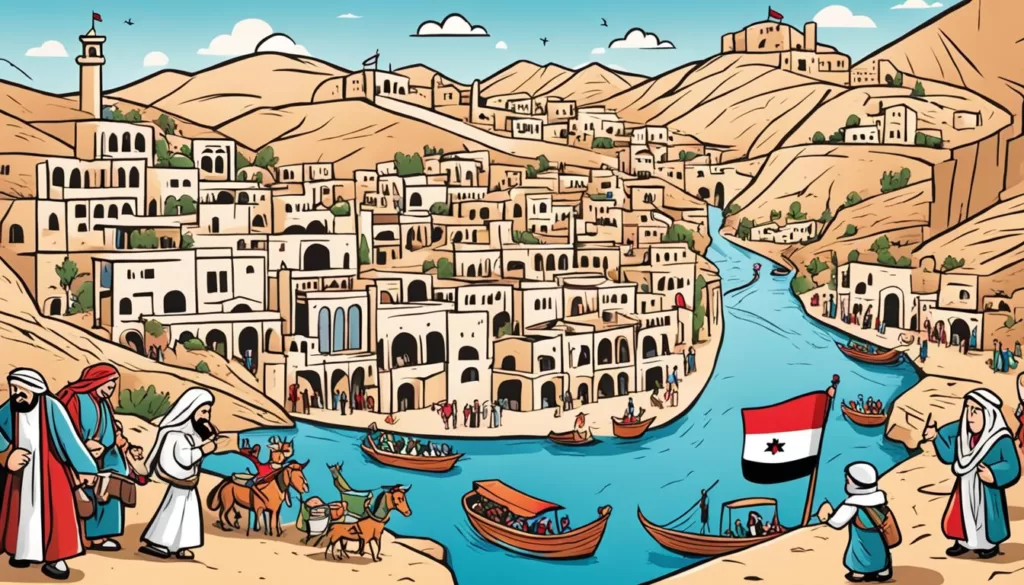
As a vital ingredient for professional advancement, the English language in Jordan has seen its integration into the very fabric of the nation’s education system, making it a vital skill set for the youth and budding professionals alike. This adoption speaks volumes of its importance, resonating with Jordan’s aspiration to pivot toward Western linguistic standards and reinforcing its place among the most spoken Jordan languages.
English as an Academic and Business Necessity
The roots of English in Jordanian soil date back to the British mandate, and today it stands as a gateway to global academia and the bustling world of international commerce. Mandatory in schools, English underpins significant facets of Jordanian life, empowering students to excel in higher learning and equipping them with the competencies required in a globally competitive job market. It is a linguistic bridge, fostering not only education but also trade, technology, and diplomacy.
Media and Entertainment in English
In the dynamic world of Jordanian media and entertainment, English has carved out a significant niche. It is the lingua franca of many a well-educated Jordanian, a language in which countless radio programs resonate and television shows flourish. Catering to an audience with a penchant for international content, English broadcasts in Jordan echo the nation’s alignment with global media trends and assert its multicultural urbanity. The prevalence of this language in the world of Jordanian media is a reflection of the nation’s cultural openness and its desire to engage in the global conversation.
Other Foreign Languages in the Cultural Fabric of Jordan
The Hashemite Kingdom of Jordan, with its mosaic of ethnicities and historical influences, is not only home to Arabic and English but also houses a vibrant array of other foreign languages. These languages enrich Jordan’s cultural fabric, painting a picture of a nation deeply connected to the world while maintaining its unique heritage.
The Presence of French Language Jordan
Among the European languages that have woven themselves into Jordan’s society, the French language in Jordan stands out. It has not only been embraced by those with an affinity for France’s culture and trade but is also an academic choice offered within the kingdom’s schools. This presence of French is indicative of Jordan’s ongoing cultural exchanges with French-speaking nations, reflecting a segment of the population’s international orientation and interests.
Minor Languages: A Reflection of Diversity

Jordan’s linguistic diversity goes further, encompassing a myriad of minor languages. It’s not unusual to find educational institutions that impart knowledge in Armenian, supporting the distinct tongues of the ethnic minorities such as Chechen and Circassian. These linguistic threads are a vibrant part of Jordan’s social tapestry, showcasing a profound respect for diverse ethnic backgrounds and a commitment to inclusivity within the kingdom.
The German and Russian Linguistic Ties
Cultural fascination and historical connections have facilitated the growth of the German language in Jordan, with many Jordanians expressing interest in German’s storied culture and technological advancements. Furthermore, the Russian language in Jordan also holds a place in the day-to-day discourse, primarily among the older generation that reminisces on the bonds between Jordan and the former USSR. These linguistic ties are yet another facet of Jordan’s complex, intercultural connections, underscoring its rich history of global interactions.
Conclusion
As we draw our exploration to a close, we weave together the intricate tapestry of Jordan’s linguistic identity. This vibrant kingdom serves as a brilliant demonstration of how language both reflects a nation’s past and shapes its future. Multilingualism in Jordan extends beyond mere communication—it is the lifeblood of cultural exchange and societal progress. In sync with the harmonic interplay of dialects and languages, Jordan’s narrative is one of resilience and convergence at the nexus of ancient trade routes and modern-day geopolitics.
The Interplay of Languages in Jordan’s Progress
The languages spoken in Jordan are not static relics but dynamic forces propelling the nation towards progress. The omnipresent Arabic language in Jordan, an official language of Jordan, resonates with the traditions and values deeply rooted in its society. Meanwhile, the English language in Jordan, acting as a channel to the wider world, elevates the nation’s global standing by enhancing communication across borders and industries. This fusion fosters a multilingual milieu where new opportunities and innovations thrive, affirming Jordan’s commitment to future-forward policies and international engagement.
Prominent Languages and Jordan’s Worldly Connections
Even amongst the dominant dialects, other languages like French and German find their place, painting Jordan’s linguistic portrait with brushstrokes of diversity. The French language in Jordan signifies lasting historical bonds with Europe, while the study of German underscores the country’s aptitude for cultural diversity and intellectual exchange. This blend of official languages in Jordan and tongues of the world reflects a society well-versed in the art of adaptation—an essential quality in an ever-evolving global narrative. As Jordan continues to navigate the complexities of regional and international diplomacy, its rich linguistic heritage anchors its identity firmly on world’s stage, unfolding a story of cosmopolitanism and cultural richness.
FAQ
What languages are spoken in Jordan?
The primary language spoken in Jordan is Arabic, which is also the official language. English is widely used and taught as a compulsory second language in schools. French, German, Russian, and Spanish are also spoken to a lesser extent, reflecting the country’s diverse linguistic landscape.
How has history and geography influenced the languages spoken in Jordan?
Jordan’s history as a crossroads between Africa, Asia, and Europe, and its geography, have influenced its languages greatly. The Arabic language holds a deeply rooted history in the region while English was introduced during the British mandate and remained significant post-independence. Other languages, such as French, German, and Russian, are reflective of cultural interactions and historical ties.
What role does Arabic play in Jordanian society?
Arabic is central to the cultural, political, and social life in Jordan. It is used in government, legal affairs, and daily communication. There are several Arabic dialects spoken in Jordan, including urban, rural, and Bedouin, each with its own unique characteristics that reflect the nation’s history and social fabric.
How prevalent is the usage of English in education and commerce in Jordan?
English is highly prevalent in Jordan and is viewed as a key language for academic success and global commerce. It is a mandatory subject in school from a young age and is frequently used in higher education, the tourism industry, business interactions, and the media.
What are the varieties of Arabic spoken in Jordan?
In Jordan, there are three main varieties of Arabic: urban dialects influenced by cities and neighboring regions, rural dialects native to those born in Jordan’s countryside, and Bedouin dialects spoken by the desert-dwelling eastern populations. Each has distinct features that contribute to the richness of the Arabic language in Jordan.
Can you explain the external influences on Jordanian Arabic?
Jordanian Arabic has been shaped by a number of languages throughout history. Lexical and grammatical aspects of French, English, and Turkish, among others, have left their imprint on the dialects spoken in Jordan, creating a unique linguistic blend.
Is English considered an academic and business necessity in Jordan?
Yes, English is considered essential for academic achievements and professional success in Jordan. It is a compulsory language in schools and is seen as important for international business and communication, science, and technology fields.
What is the role of media and entertainment in English in Jordan?
English-language media and entertainment play a substantial role in Jordan, with many television shows, movies, and radio programs broadcasted in English. This not only caters to an educated audience but also reflects the desire to engage with global cultures and keep up with international standards.
How significant is the French language in Jordan?
The French language holds a visible presence in Jordan, spoken among those with cultural and business ties to France. It is taught as a foreign language in many schools and utilized by French businesses and cultural institutions within the country.
What do minor languages tell us about diversity in Jordan?
Minor languages such as Armenian, Chechen, and Circassian, reflect the ethnic diversity and the historical interactions of the country with different cultures. Their presence speaks to the multicultural fabric of Jordanian society and the nation’s openness to different cultures.
Can you elaborate on the German and Russian linguistic ties to Jordan?
Jordan has linguistic ties to German and Russian due to its historical associations and intercultural exchanges. Some Jordanians speak German or Russian, often as a result of study or work experiences in Germany or former Soviet states. These languages serve as a link to cultural, educational, and diplomatic relationships.
How do the various languages spoken in Jordan contribute to its progress?
The array of languages spoken in Jordan, such as Arabic, English, French, German, and Russian, enriches the country’s cultural dialogue and facilitates global economic ties. They reflect the nation’s ability to adapt and embrace multiculturalism, thereby enhancing Jordan’s development and its position in the world.
What importance do prominent languages hold in Jordan’s global connections?
Prominent languages like Arabic and English foster strong global connections for Jordan. Arabic binds it to the Arab world and Islamic culture, while English serves as a bridge to the international community. The presence of European languages like French and German also underscores the country’s diverse cultural exchanges and diplomacy.





